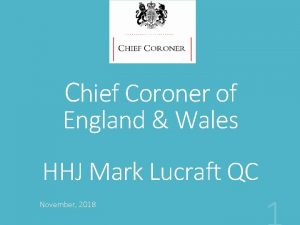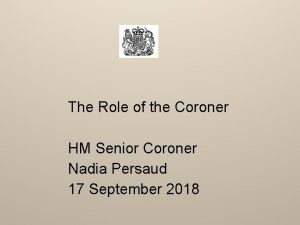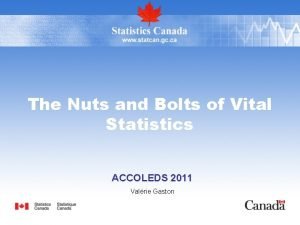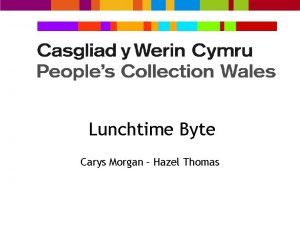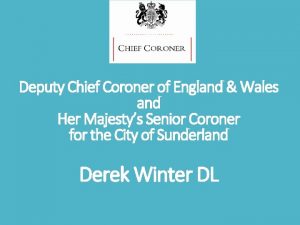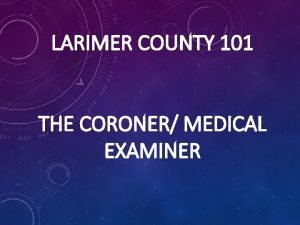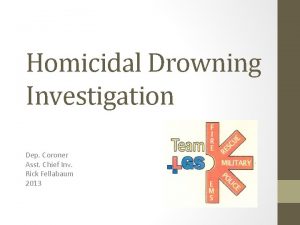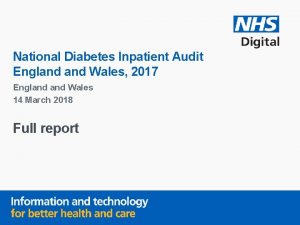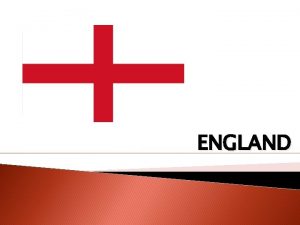Chief Coroner of England Wales HHJ Mark Lucraft














- Slides: 14

Chief Coroner of England & Wales HHJ Mark Lucraft QC November, 2018

Who is he? • Barrister in practice between 1984 -2012. Specialising in criminal law with an emphasis on serious and complex fraud. • Appointed QC in 2006 • Recorder in 2004 • Circuit Judge 2012. • Seconded to Central Criminal Court April 2015. • Appointed as Chief Coroner of England & Wales October 2016. • Permanent Judge at the Central Criminal Court February 2017.

Two roles - crime • Sitting as a judge at the Central Criminal Court (Old Bailey) – major criminal trials in London and South-East but also cases of national importance: • Homicide • Terrorism • Sitting in the Court of Appeal – Criminal Division – sentence and conviction appeals

Old Bailey • Recent trials: • 5 handed murder case – shooting • Attempted murder in a car • Terrorism – funding • Attempted murder • Murder/manslaughter, conspiracy to rob

Legal issues that arise • Joint enterprise • Young defendants • Mental health issues • Sentencing on manslaughter • Confiscation

Chief Coroner. • National lead for coroners in England & Wales • Training • Guidance • Reporting to Lord Chancellor and Lord Chief Justice • Sitting as a judge in the High Court on judicial reviews • Dealing with applications for inquests where there is no body • Applications for inquests after burial or cremation

Work in progress • Key issue – consistency of approach. • Review of cases over 12 months – understanding why? • An appraisal scheme for coroners – January 2019 • Mentoring for full-time coroners • Workshops for part-time coroners interested in full-time appointment. • Workshops for those considering applying to be assistant coroners.

Work in progress • Guidance – 2017 - Do. LS, and Organ Donation • 2018 – prioritisation, • Coming soon: ‘short form’ inquests, second post-mortems • Reg. 28 reports. • Revising Mo. Us between coroners and others. • Pathologists willing to do coronial work

What next? • Annual report due to be published. • Visits to coroner areas – on-going • Medical examiners – April 2019? • Local authority conference • Chief Coroner’s Conference. • Modern ways of working – going digital • Attacking inconsistency

Stats for 2017 - headlines. • 229, 700 deaths reported to coroners in 2017. • What of deaths not reported? • Registered deaths – 533, 118 • 43% of all registered deaths reported – 3% down on 2016 • 85, 600 post-mortem examinations ordered by coroners in 2017. Since 1995 decrease from 61% to 31% (proportion of deaths) • Time to inquest (from date of death to conclusion) 21 weeks

Stats (2). • Excluding Do. LS, deaths in state detention 528. • Deaths while detained under Mental Heath Act. • Deaths in prison custody. • Deaths in police custody. • 31, 519 inquests opened in 2017 – down 18% - Do. LS • In 127, 601 cases - no post-mortem and no inquest.

Stats (3). • 33, 945 inquest conclusions recorded. • 49% of conclusions take 2 forms: natural causes (27%), accident/misadventure (22%). Suicide at a steady 9%. • Figures at extremes of particular concern. • PMs rates -21% and 59% why? • Note: 1, 671 PMs using less invasive techniques • 23% of all PMs include histology (as 2016). 20% PMs including toxicology + 5% • Time taken to inquest - 9 weeks and 45 weeks why? .

Challenges going forward. § Medical Examiners – key part of the reforms in the 2009 Act § Clarity of circumstances when a death should be reported to the coroner § Adequate provision of resources by local authorities § Consistency of approach by coroners § Consistency of reporting on preventing future death. § Dame Elish Angiolini report § Bishop James Jones report

Questions? HHJ Mark Lucraft QC chiefcoronersoffice@judiciary. gsi. gov. uk
 Mark lucraft qc
Mark lucraft qc National flower of northern ireland
National flower of northern ireland Lesson 3 commander in chief and chief diplomat
Lesson 3 commander in chief and chief diplomat Nadia persaud coroner
Nadia persaud coroner Medical examiner vs coroner
Medical examiner vs coroner Nc ocme
Nc ocme Medical examiner vs coroner
Medical examiner vs coroner Accoleds
Accoleds Lorain county coroner
Lorain county coroner Cities in wales
Cities in wales Childhood obesity in wales
Childhood obesity in wales Arbed wales
Arbed wales Prince edward family tree
Prince edward family tree Carys morgan
Carys morgan Llandudno map of wales
Llandudno map of wales
